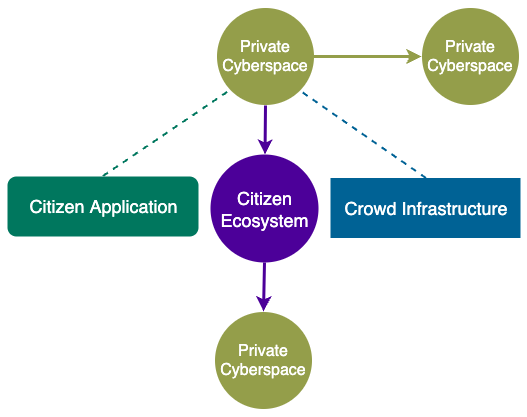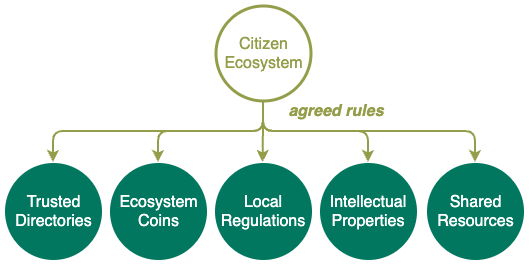Introduction
1.2. Citizen Data
The value of DATA as an key economic input has been established for a while (IMF 2019)
2. Ecosystem
Although Private Cyberspaces can interact directly with each other at anytime under mutually agreed rules, Citizen Ecosystems provide ready made structures that Private Cyberspaces with common interests can join and interact with each other based on predefined rules of the ecosystem, WITHOUT needing to make individual interaction agreements with each other.
Common functions provided by the Citizen Ecosystem are:
- Maintain trusted directories.
- Issue ecosystem coins.
- Liaise with government departments.
- Protect intellectual property rights.
- Manage shared resources.
1.2. Joining and Leaving
Some Citizen Ecosystems, like National Ecosystems are public and can be joined by anyone, while others are private and opened to certain Private Cyberspaces.
Besides joining existing Citizen Ecosystems, Private Cyberspaces can also work together and create a new Citizen Ecosystem for themselves.
Leaving Citizen Ecosystems is very easy, unlike Cloud Platforms, with Private Cyberspaces both the algorithms and storages are already on your infrastructure, there is NO need to export information NOR worry that your data has not been deleted.
1.3. Citizen Controlled
Citizen contributed and audited directories provides trusted sources of truth so Private Cyberspaces interact with Private Cyberspaces that they have no prior knowledge of or that they do not trust.
Besides standard updating and reading operations on the directories, these directories also support monitoring and auditing by ANY member - even members without much computing resources.
2. National Ecosystems
There is normally at least one Citizen Ecosystems for each country to ensure that interactions between Private Cyberspaces follow the law of that country.
Due to the separation of power principle, the global citizen ecosystem 88.io CANNOT operate as a National Ecosystem in any country. It can help start other ecosystems and it may act as a back up in rare cases, but it was never designed to be the primary ecosystem for everyday use.
Currently, 3 trial national citizen ecosystems are being developed in 3 countries:
- net2max.au - Australia
- net2max.cn - China
- net2max.us - United States of America
These are trials ecosystems for fine tuning of the ecosystem deployment process, it is expected that local citizens will deployment ecosystems in those countries themselves for production use by the public.
Some government departments and large enterprises are also expected to deploy their own ecosystems for sovereignty and security reasons.
Due to the separation of power principle, within each public ecosystems (where users do not belong to the same organisation) each legal entity can only be ONE of ecosystem coordinator, application provider or infrastructure supplier.

